Gaming Benchmarks - Direct3D
There are an incredible number of tests we wanted to run in order to explore all the different aspects of gaming on Vista versus gaming on XP both in 32- and 64-bit modes. For this first look, however, we will be sticking with single card setups on Vista x86, Vista x64, and Windows XP x86. In the future, we plan on looking at multi-GPU performance as well as the performance of games on Windows XP x64. With Vista, Microsoft has improved the gaming on 64-bit landscape significantly, and we would like to see just how far we have come.
For now, we will be looking at a selection of cards from AMD and NVIDIA: five cards from the Radeon X1K series and five cards from the GeForce 7 series, as well as both current 8800 parts. These tests will look at GPU and CPU limited situations, and we will be comparing Vista x86 with Windows XP as well as Vista x64 to see where there are any differences. We will also look at resolution scaling on each of our three test operating systems, but only with two cards representing AMD and NVIDIA: the X1950 XTX and 8800 GTX.
In terms of APIs, one DirectX and one OpenGL game will be tested. Oblivion will represent the MS API, while Quake 4 will be showing off OpenGL performance on Vista. We have also taken a look at a native 64-bit game. Valve's Half-Life 2: Lost Coast will be run on all three operating systems in native mode. We would like to have compared HL2:LC running in WoW at 32-bit under x64, but we have not been able to figure out how to test it without running in 64-bit mode yet.
First up is Oblivion performance. DirectX performance should be as close as possible to Windows XP performance as this is Microsoft's baby. First, let's take a look at Vista x86 numbers divided by Windows XP scores for CPU limited and GPU limited cases. This will give us the speed up (numbers above one) or slow down (numbers less than one) as compared to Windows XP. Just remember that there is some normal fluctuation in performance on both sides, so we could see a wider margin of error here than in our standard comparisons.
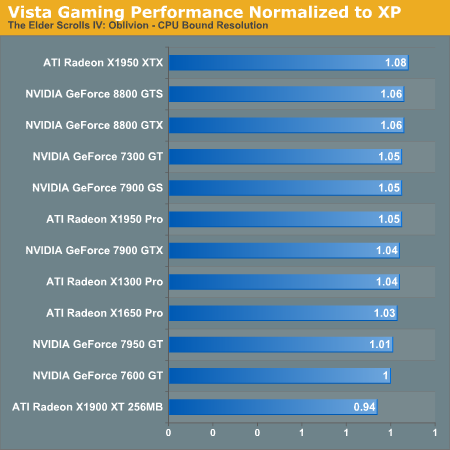
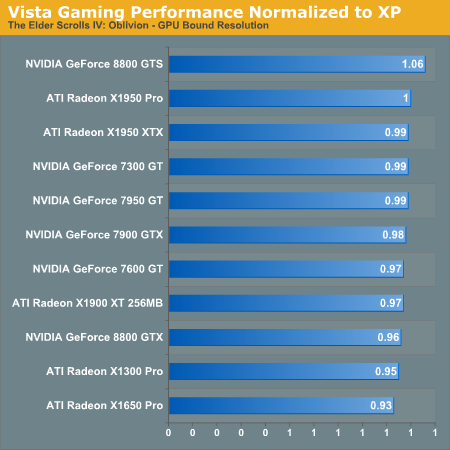
For CPU bound tests, almost every card performs better under Windows Vista than under Windows XP; the lone exception is the X1900 XT 256MB. This indicates that Vista is better able to provide system resources to DirectX games, which is actually quite surprising considering the overhead that Vista adds to the system.
When we take a look at the GPU bound case, we see almost the opposite with only the 8800 GTS performing better than it does on Windows XP. This does line up with what we would expect. There is more involvement from the OS in the rendering pipeline and less direct access to the hardware by games. Vista is now able to manage graphics memory and graphics drivers must support sharing of hardware resources between multiple programs. Luckily, the differences aren't that huge. While the hardcore gamers won't be happy with any performance loss, Microsoft is betting that in the long term the advantages will outweigh the loss in framerate.
Now let's take a look at how Vista stacks up against XP in an x86 vs. x64 comparison
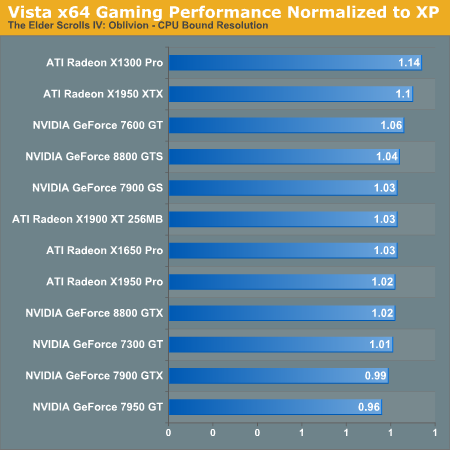
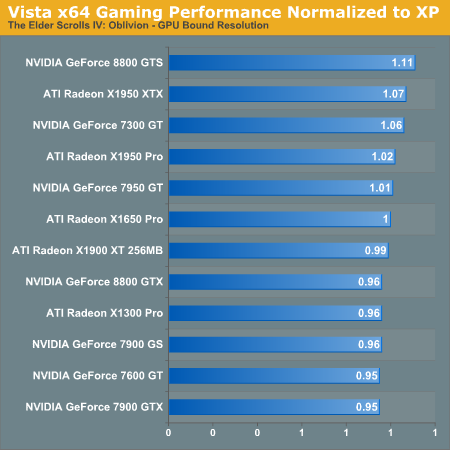
On the CPU limited results, most of the cards again run faster on Vista x64. This is frankly amazing, as even Microsoft expects performance to be slightly slower on Vista. In the GPU limited results, we see basically a random scattering of cards that are slightly slower or faster under Vista x64. Given that Oblivion is a 32-bit application running in WoW, we would be pretty happy with only small performance losses, and any performance improvements are unexpected but welcome. All in all, x64 performance looks good, and we haven't seen the types of compatibility and stability issues between the two that we did with XP x64.
Last up for Oblivion is resolution scaling.
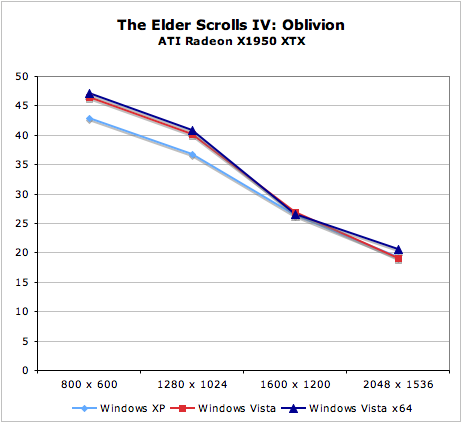
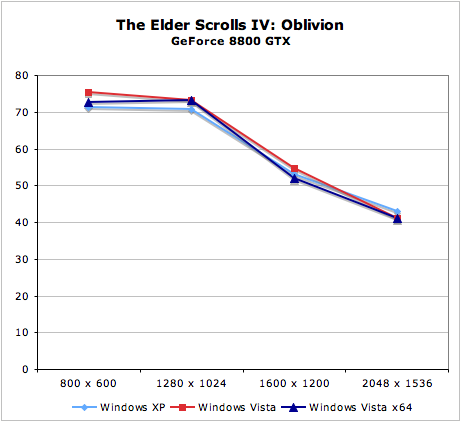
Both the 8800 GTX and X1950 XTX scale very similarly across platforms. There does seem to be more difference in CPU limited settings, while performance seems to converge as resolution increases.
There are an incredible number of tests we wanted to run in order to explore all the different aspects of gaming on Vista versus gaming on XP both in 32- and 64-bit modes. For this first look, however, we will be sticking with single card setups on Vista x86, Vista x64, and Windows XP x86. In the future, we plan on looking at multi-GPU performance as well as the performance of games on Windows XP x64. With Vista, Microsoft has improved the gaming on 64-bit landscape significantly, and we would like to see just how far we have come.
For now, we will be looking at a selection of cards from AMD and NVIDIA: five cards from the Radeon X1K series and five cards from the GeForce 7 series, as well as both current 8800 parts. These tests will look at GPU and CPU limited situations, and we will be comparing Vista x86 with Windows XP as well as Vista x64 to see where there are any differences. We will also look at resolution scaling on each of our three test operating systems, but only with two cards representing AMD and NVIDIA: the X1950 XTX and 8800 GTX.
In terms of APIs, one DirectX and one OpenGL game will be tested. Oblivion will represent the MS API, while Quake 4 will be showing off OpenGL performance on Vista. We have also taken a look at a native 64-bit game. Valve's Half-Life 2: Lost Coast will be run on all three operating systems in native mode. We would like to have compared HL2:LC running in WoW at 32-bit under x64, but we have not been able to figure out how to test it without running in 64-bit mode yet.
First up is Oblivion performance. DirectX performance should be as close as possible to Windows XP performance as this is Microsoft's baby. First, let's take a look at Vista x86 numbers divided by Windows XP scores for CPU limited and GPU limited cases. This will give us the speed up (numbers above one) or slow down (numbers less than one) as compared to Windows XP. Just remember that there is some normal fluctuation in performance on both sides, so we could see a wider margin of error here than in our standard comparisons.


For CPU bound tests, almost every card performs better under Windows Vista than under Windows XP; the lone exception is the X1900 XT 256MB. This indicates that Vista is better able to provide system resources to DirectX games, which is actually quite surprising considering the overhead that Vista adds to the system.
When we take a look at the GPU bound case, we see almost the opposite with only the 8800 GTS performing better than it does on Windows XP. This does line up with what we would expect. There is more involvement from the OS in the rendering pipeline and less direct access to the hardware by games. Vista is now able to manage graphics memory and graphics drivers must support sharing of hardware resources between multiple programs. Luckily, the differences aren't that huge. While the hardcore gamers won't be happy with any performance loss, Microsoft is betting that in the long term the advantages will outweigh the loss in framerate.
Now let's take a look at how Vista stacks up against XP in an x86 vs. x64 comparison


On the CPU limited results, most of the cards again run faster on Vista x64. This is frankly amazing, as even Microsoft expects performance to be slightly slower on Vista. In the GPU limited results, we see basically a random scattering of cards that are slightly slower or faster under Vista x64. Given that Oblivion is a 32-bit application running in WoW, we would be pretty happy with only small performance losses, and any performance improvements are unexpected but welcome. All in all, x64 performance looks good, and we haven't seen the types of compatibility and stability issues between the two that we did with XP x64.
Last up for Oblivion is resolution scaling.


Both the 8800 GTX and X1950 XTX scale very similarly across platforms. There does seem to be more difference in CPU limited settings, while performance seems to converge as resolution increases.










105 Comments
View All Comments
nishzone - Saturday, May 24, 2008 - link
Hi,I'm glad tnat your memory usage is similar to mine and therefore I might finally understand this. You have 2 gig of Ram...I understand that superfetch is the reason free ram is 0 (cache increases as free memory decreases). But why is the memory usage 45%? so around 1 gig?
I also have 50% usage on startup. Is vista using 1 gig memory? There is something I don't understand here because you recommended 1 gig for general users.
Regards,
Nishzone
Dataland - Wednesday, November 28, 2007 - link
I think Microsoft needs a performance reset. As I've said in some previous posts, I think software in general, and Microsoft software in particular, is getting slower at faster rate than hardware is getting faster. And this problem acutely affects Vista. I think Microsoft needs... (Pingback)Performance Reset
http://dataland.wordpress.com/2007/11/28/performan...">http://dataland.wordpress.com/2007/11/28/performan...
Kondado - Saturday, February 10, 2007 - link
I've done my own tests. I sent the same amount of data (51 files, 2,5 GB) once from XP to Samba, then from Vista to Samba (OpenBSD). Then I did the same from XP to XP, and from Vista to XP. XP was always a LOT faster.I would really know if it's the drivers or the stack...
jonp - Monday, February 5, 2007 - link
It seems like the budget system area was a little overlooked in this review of Vista. So I have some questions:"Memory in Vista..." - It appears that acceptable multitasking performance is found somewhere in the 3GB to 4GB memory size area. Many budget systems have only two memory slots and many new ones support dual memory access. This will force budget systems to 4GB which is fairly pricey now and probably will be for some time.
"CPU Performance..." - Your love for anything Core2 Duo shines here. But what about the dual core Pentium Ds? Like the D915 2.8GHz processor. Yes it is Netburst, but also easier on the budget than a Core 2 Duo processor. We need something more specific here in terms of benchmarks/guidelines.
Video adapters - I didn't see anything that talked about integrated video adapters vs. VGA/PCIe video adapters. Are any of the integrated graphic engines, like Intel 950GMA provide acceptable performance for VISTA? How about older video cards? Minimum graphics memory? Graphics engine speed? Again we need more specific guidance here.
Hard drive - You addressed hard drive performance, in a way, in the "Vista Search for Fast Drives Only" section. But again no specific device selection guidelines like: RPM, cache size, average access, size, data transfer rate, ...
Virtualization - It appears that MS forbids the use of virtualization products with Vista Home Basic and Home Premium editions forcing budget users to more costly editions of Vista.
Upgrade or "clean" install? - Not strictly a budget system issue; the web if full of warnings about NOT trying to upgrade to Vista --- that it should only be a "clean" install situation. That upgrading is fraught with too many pitfalls that it isn't even worth trying. And not all editions of Vista are allowed to do in-place upgrades of the XP editions; oh, and you can't do an in-place upgrade of anything prior to XP. See http://tinyurl.com/36ljxv">http://tinyurl.com/36ljxv for some upgrade details.
JarredWalton - Monday, February 5, 2007 - link
Basically, a lot of that falls into areas we are going to look at in future articles. Given that we don't really recommend most people upgrade to Vista yet, the lower-end your system is the less we would consider Vista. Pretty much all of the DX9 NVIDIA and AMD cards do fine with the Vista Aero Glass UI, but IGP solutions are slower. Individual tolerance for the UI will vary; I'm sure plenty will be okay with GMA950 and Glass, while others won't want anything less than a $100 discrete GPU. Oh, and GPU drivers for Vista are still flaky, IMO. :)
HDD, anything 7200 RPM should be fine. CPU, really with a decent GPU the requirements aren't all that much higher than XP. RAM is more important - don't even think about Vista with less than 1GB - but HDD and CPU most people with anything made in the past two years will be fine. Just my opinion there - individual usage and preferences will again play a role.
I wouldn't say 3-4GB of RAM is even remotely necessary for most people. A few will like it, but 2GB is still sufficient for about 99% of people.
Virtualization and Upgrades... I'll have to defer to others there. Again, I recommend discretion, so I would tend towards doing a full backup (Ghost or similar) of any system before doing a Vista upgrade. I believe Gary is about to revert his system for the time being, as Vista has just had a few too many glitches. The number of people that worry about virtualization - really intending to use it, not just for test purposes - is again very small. I think mostly we're seeing the vocal minority complaining. Still, I find it odd that MS even worries about whether or not people run the OS via virtualization - unless the glitches are aggravated by such an environment, which is entirely possible.
jonp - Tuesday, February 6, 2007 - link
Thanks Jarred...you insights are always very helpful and I am glad that these topics will get more focus in the future. Jonjonp - Monday, February 5, 2007 - link
Both of the charts in the Compound TCP section for Windows Vista say "Compact" and not "Compound".duploxxx - Sunday, February 4, 2007 - link
Its probably me that's missing a page or so but could you guys explain what system you used for these tests?funk3y - Saturday, February 3, 2007 - link
HelloI also spent some time testing the network part of windows vista, and I discovered some quite interesting things:
Windows Vista is reducing the network I/O when an application using the audio interface is launched, I discovered this when copying large files over my network.
When I copy large file through the network the average speed is 40 mb/sec and the taskmanager whow 30-50% of network use, as soon as I start an application playing sound (WMP, Skype, Warcraft III, ....) the rate drop to 8 mb/sec and the network use in the taskmanager never go beyond 12.5%
I achieved those test on different hardware, with differents drivers and the results are always the same; it is just impossible to get further then 12.5% of network use while playing a sound.
My guesses are that microsoft voluntary did this, in order to avoid sound crackling. Because of the new driver scheme, bad written drivers having to do many I/O could lead to sound degradation (I had this issue while using my raptors RAID on a NF4 board; making a lot of I/O on the disk just killed the sound quality).
As you where streaming a film while benchmarking, you may have been in this situation. It could be nice if you could rerun some benchmark taking into account all what I have written.
As I am already posting, here are some other consideration about DOS and vista:
-It is just impossible to launch a DOS application in fullscreen mode! This functionnality lack can be really painfull in environnement where DOS application are still well used; I just don't understand microsoft's choice
-I don't think that vista x64 is still able to launch 16 bit apps anymore (keep this in mind before upgrading to x64!)
ministerchief - Saturday, February 3, 2007 - link
I have a "Corsair Flash Voyager 4Gb" usb stick and I can't use it to "BOOST" my system.So, how anandtech could use it ?
Can someone tell me how to use this flash drive with the "READY BOOST" feature.
THX